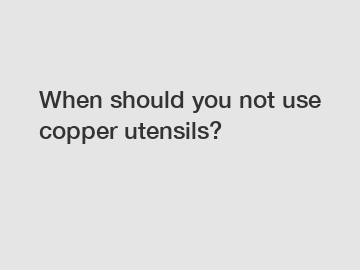When should you not use copper utensils?
When it comes to choosing the right utensils for your kitchen, copper has long been a popular choice. Not only does it have a beautiful, timeless look, but it also boasts excellent heat conduction properties. However, like any material, there are certain circumstances where using copper utensils may not be ideal. In this blog, we will discuss when you should avoid using copper utensils in your kitchen.
One of the most important factors to consider when using copper utensils is the acidity of the food being prepared. Copper is a reactive metal, which means that it can interact with acidic foods, leading to the leaching of copper into the food. This can be harmful to your health, as excessive copper intake has been linked to various health problems, including liver damage and gastrointestinal issues. Therefore, it is best to avoid using copper utensils when cooking or storing acidic foods, such as tomatoes, citrus fruits, or vinegar-based dishes.
Another situation where you should refrain from using copper utensils is when cooking at high temperatures. While copper is an excellent conductor of heat, it can also reach extremely high temperatures very quickly. When exposed to high heat for extended periods, copper can release toxic fumes that can be harmful to your health. To avoid this, it is best to use copper utensils for low to medium-heat cooking and to avoid using them for tasks that require high temperatures, such as searing or broiling.

Furthermore, if you have a nickel allergy, you should be cautious when using copper utensils. Many copper cookware and utensils are lined with nickel to prevent copper from leaching into food. If you have a nickel allergy, this can cause an allergic reaction when in contact with your skin or when consuming food prepared with nickel-lined copper utensils. In this case, it is best to opt for nickel-free cookware or utensils to avoid any potential health issues.
Additionally, if you are looking to store food in copper containers or use copper water bottles, it is essential to be mindful of the cleanliness of the utensils. Copper is prone to tarnishing and oxidizing when exposed to air, moisture, or acidic foods, which can lead to the formation of harmful compounds. To prevent this, it is crucial to clean and dry copper utensils thoroughly after each use and avoid storing food in them for extended periods.
Another situation where you should refrain from using copper utensils is when preparing certain types of food that can react with copper. For example, dairy products, such as milk or yogurt, can react with copper, leading to a metallic taste in the food. Similarly, using copper utensils to cook or store foods high in salt content can also cause the copper to corrode and leach into the food. To avoid these issues, it is best to use alternative utensils, such as stainless steel or glass, for preparing and storing these types of foods.
In conclusion, while copper utensils can be a beautiful and functional addition to your kitchen, there are certain circumstances where they may not be the best choice. To ensure your health and safety, it is essential to be mindful of the acidity of the food being prepared, cooking temperatures, nickel allergies, cleanliness, and food compatibility when using copper utensils. By following these guidelines, you can enjoy the benefits of copper utensils while minimizing any potential health risks. Remember, when in doubt, it is always best to err on the side of caution and choose a safer alternative for your cooking needs.
Contact us to discuss your requirements of Audio Cable Supplier, 12 cores gyxtw cable, odf fibre. Our experienced sales team can help you identify the options that best suit your needs.
253
0
0

Comments
All Comments (0)